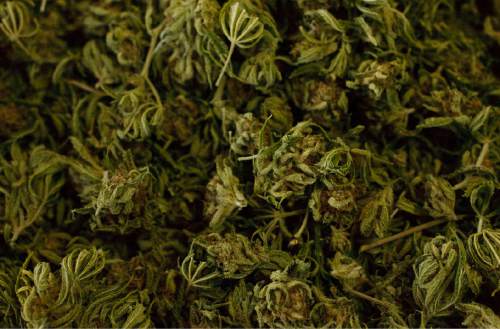This is an archived article that was published on sltrib.com in 2016, and information in the article may be outdated. It is provided only for personal research purposes and may not be reprinted.
Pharmaceutical-grade cannabis already is providing some with severe epilepsy relief less than two years after clinical trials began in Utah.
The University of Utah's Division of Pediatric Neurology and Primary Children's Medical Center began in September 2014 the first of three separate clinical trials involving Epidiolex, a liquid, purified form of cannabidiol (CBD), which is a nonpsychoactive chemical in marijuana.
Early results indicate trial participants have seen about a 40 percent decrease in the frequency and severity of seizures, said neurologist Francis Filloux, an author on the study.
That number jibes with data published by GW Pharmaceuticals, the British company manufacturing the drug that approved Primary Children's as a study site. Stephen Schultz, a spokesman for the company, said officials will request a meeting with the Food and Drug Administration to discuss next steps.
"We believe that the results from our first trial … [are] probably enough for us to file the new drug application," Schultz said, adding that approval could take 16 months.
Epidiolex is similar but not identical to the "artisanal" CBD oils, which contains trace amounts of of tetrahydrocannabinol (THC), the ingredient in marijuana that gets users high.
Utahns with severe epilepsy are allowed, under a law passed in 2014, to import whole-plant CBD extracts from states where medical marijuana is legal. At least 15 states have similar laws on the books, according to the National Conference of State Legislatures.
As of October, 113 Utahns had received a hemp extract registration card under the state's law, according to the Utah Department of Health.
State lawmakers tried to the push even further this past session by legalizing medical marijuana. A proposal to permit full-plant cannabis use failed in the final hours of the legislative session when they found there was no money to implement the program.
Primary Children's and the U. are in the middle of three trials related to epilepsy: an open-label observational trial, which means everyone enrolled will receive Epidiolex; and two controlled trials focused on specific kinds of epilepsy disorders in which some participants could receive a placebo.
The trials are focused on children and young adults who have treatment-resistant epilepsy, defined as not responding to at least four anti-epileptic drugs. About 30 individuals have participated in the three trials at some point.
Those participating in the trials are administered the drug from home.
Along with seizure relief, Filloux said, some families also have reported improved alertness and better sleep patterns.
One trial participant even reported being completely seizure-free after using Epidiolex.
Not all side effects observed are beneficial, however. Some have experienced nausea, diarrhea or appetite changes. Filloux also said he has to watch children carefully for depression or suicidal thoughts.
Filloux expects the trials to come to an end in the next few years, as study physicians, scientists and GW Pharmaceuticals prepare to publish their worldwide findings.
Twitter: @alexdstuckey



